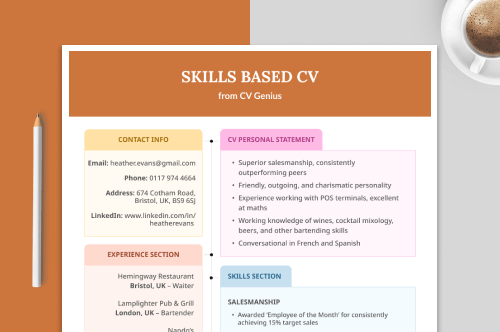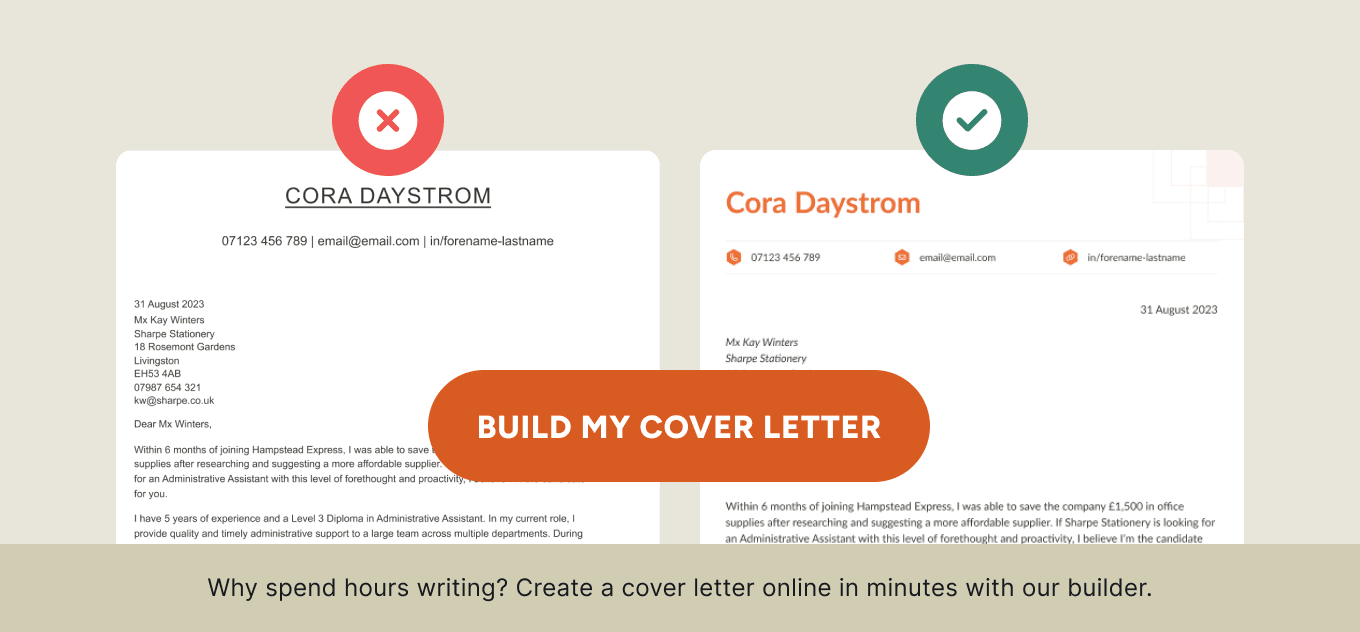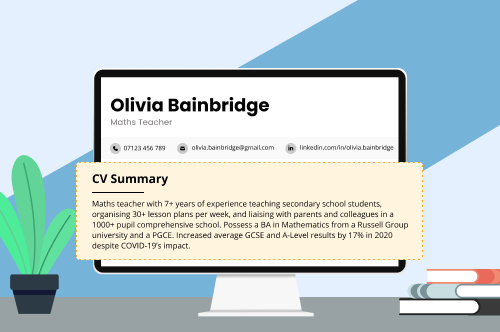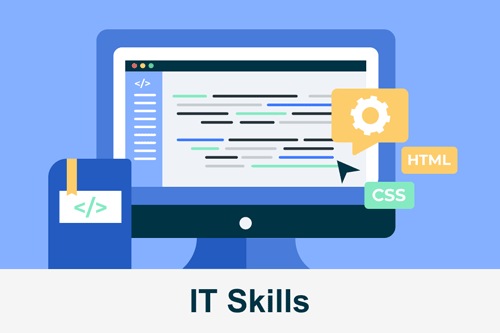What is a skills based CV?
A skills based CV (also known as a functional CV) is a type of CV layout that focuses on your skills rather than your work experience.
Unlike traditional layouts, skills based CVs have large, detailed skills sections highlighting a few of your most relevant CV skills and explaining what you’ve achieved with them.
This format makes the skills based CV ideal if you’re writing your first CV, starting a new career, or preparing to apply for jobs after university.
Ready to write a strong skills based CV? Use our downloadable examples, template, and writing guide to get it done today.
Skills based CV example and template
Here’s a skills based CV example to give you an idea of what this format should look like. You can download this template to edit in your word processor or copy and paste the text template below if you’ve already chosen a CV template design that you like more:
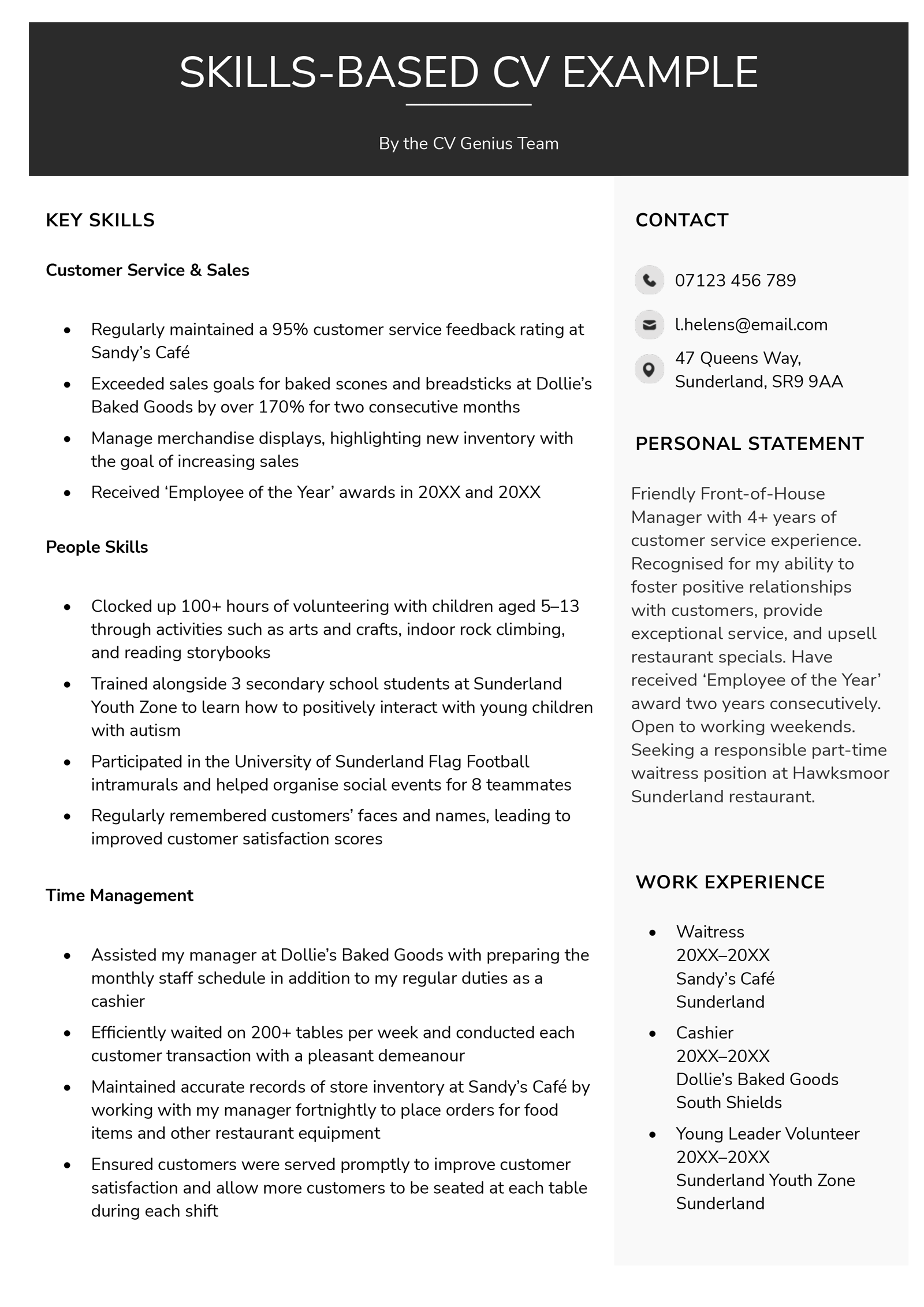
Skills Based CV Example (Copy-&-Paste)
PERSONAL STATEMENT
Friendly Front-of-House Manager with 4+ years of customer service experience. Recognised for my ability to foster positive relationships with customers, provide exceptional service, and upsell restaurant specials. Have received ‘Employee of the Year’ award two years consecutively. Open to working weekends. Seeking a responsible Front-of-House Manager at Hawksmoor Manchester restaurant.
KEY SKILLS
Customer Service & Sales
- Regularly maintained a 95% customer service feedback rating at Sandy’s Café
- Exceeded sales goals for baked scones and breadsticks at Dollie’s Baked Goods by over 170% for two consecutive months
- Manage merchandise displays, highlighting new inventory with the goal of increasing sales
- Received ‘Employee of the Year’ awards in 20XX and 20XX
People Skills
- Clocked up 100+ hours of volunteering with children ages 5–13 through activities such as arts and crafts, indoor rock climbing, and reading storybooks
- Trained alongside 3 secondary school students at Manchester Youth Zone to learn how to positively interact with young children with autism
- Participated in the University of Manchester’s Flag Football intramurals and helped organise social events for 8 teammates
Time Management
- Assisted my manager at Dollie’s Baked Goods with preparing the monthly staff schedule in addition to my regular duties as a cashier
- Efficiently waited on 200+ tables per week and conducted each customer transaction with a pleasant demeanour
- Maintained accurate records of store inventory at Sandy’s Café by working with my manager fortnightly to place orders for food items and other restaurant equipment
EDUCATION
University of Manchester, September 20XX – Present
BSc (Hons) Nutritional Sciences — upper second class honours (2:1)
Relevant Modules: Principles of Food and Nutrition, Physiology and Health, The Chemistry of Food
Manchester High School for Girls, 20XX – 20XX
A-levels: Maths (A), French (A), English Literature (A)
GCSEs: 10 A–C including Maths, English, Combined Science, and Geography
WORK EXPERIENCE
Waitress, 20XX – 20XX
Sandy’s Café, Manchester
Cashier, 20XX – 20XX
Dollie’s Baked Goods, Manchester
Young Leader Volunteer, 20XX – Present
Manchester Youth Zone, Manchester
Look through our CV examples library for even more ways to showcase your skills.
How to write a skills based CV
The process of writing a skills based CV is a little different from how you would write a standard CV. Follow these seven steps to lay out each section correctly.
1. List your name and contact information
Include the following information at the top of your CV:
- First and last name
- Target job title
- Mobile phone number
- Email address
- Location (You don’t need to put your full address on your CV)
2. Write an effective personal statement
For your CV personal statement, write 2–4 sentences or bullet points highlighting your top skills and accomplishments.
If you’re starting a new career, briefly mention a career goal or reason for applying. Doing so will personalise your application and show how you plan to apply your skills if given the job.
Here’s an example of a convincing personal profile that would look great on a skills based graduate CV. Despite not having previous work experience, the applicant highlights their transferable skills (researching, writing, and presenting) and technical skills (2D modelling software and risk management).

3. Group your CV skills by type
Your skills section is the most substantial part of your skills based CV, so including the right information is essential. Here’s how to add and format your skills correctly:
To write the skills section of your skills based CV:
- read the job advert carefully to find the skills employers are looking for
- think of any skills you have that would address the job requirements
- add the 3–5 most relevant skills to your CV
- for each skill, write 3–5 bullet points highlighting relevant achievements
This is an example of a CV skills section for a community coordinator role at a tech company:
Transferable skills section on a skills based CV
TECHNICAL
- Utilised Adobe Photoshop, Illustrator, Figma, and InDesign to create personalised graphics and infographics for businesses as a freelancer
- Created 2+ new websites for small businesses using JavaScript, React, and Ruby on Rails
- Taught HTML and CSS to online audiences of 50+ using Zoom
INTERPERSONAL
- Coached 10+ young entrepreneurs through 1–1 video calls on topics including self-confidence, overcoming failure, and goal setting
- Volunteered at Hybrid Career Centre from 2017–2018, mentoring 20 recent graduates on designing their online portfolios and personal websites
- Acted as a confidant and teacher for 5 secondary school pupils interested in tech through Meet-a-Mentor programme
CUSTOMER SERVICE
- Actively supporting existing and former members of the London Innovation Tech Group as a Facebook moderator
- Answered questions regarding UI/UX, graphic design, and mentorship opportunities from new members through Facebook Messenger
- Discovered new ways of engaging group members through relevant prompts, questions, and short videos
Start each bullet point with a strong action verb like ‘created’, ‘coached’, or ‘discovered’ to convey confidence and intuition.
4. Include your employment history
Because this is a skills based CV, you should write less than you would in a traditional work experience section. Just include the essential information:
- Job title
- Company name
- Dates of employment (optional)
- Location
- A one-line description of the job if the role isn’t immediately clear to the reader
If you’re not including your dates of employment, list your jobs from most to least relevant. If you are including the dates, list them from the most recent to the earliest.
For instance, have a look at this applicant’s work history for a teaching position:
Employment history on a skills based CV
Teaching Assistant
Leeds Arts University, Leeds
Makeup Artist
Sephora, Brixton, London
Sales Clerk
TK MAXX, Brixton, London
5. Outline your education
Skills based CVs have a short education section to highlight your schooling, uni degree, and any other formal training that you received.
Normally the education section goes near the end of your CV, but if you’re applying for your first job after graduation, put it above your skills section.
Here’s an example of a CV education section on a skills based CV:
Education section on a skills based CV
MA Computer Games Art and Design, Goldsmiths, University of London, 2019–2021
6. Mention your relevant hobbies and leisure activities
Listing your hobbies and leisure activities on your CV is a great way to highlight your personality and skill set, especially if you lack work experience (e.g. you’re writing a CV as a 16-year-old).
Try to include hobbies and interests that relate to the job you want because it shows recruiters you’ve targeted your CV to their job advert.
For instance, ‘photography’ and ‘website design’ are valuable additions for a graphic designer CV, but ‘watching YouTube videos’ isn’t.
7. Write a cover letter to connect your skills to the job
Skills based CVs are incredibly useful for showing that you understand the job requirements and highlighting your relevant skills. But because the focus is on you, it can be difficult to clearly outline your motivations for applying and goals within the hiring company.
Writing a strong cover letter will help you make that connection.
Use your cover letter to give context to one or two of your most impressive skills-based achievements and explain your reasons for wanting to work for the employer. To convey professionalism, follow standard cover letter formatting and write concisely.
Or if you have writer’s block consider using a cover letter builder to do some of the hard work for you by generating a quick first draft.
Frequently asked questions about skills based CVs
Still have doubts about this CV layout? Here are the answers to three questions about skills-based CVs:
1. When should I use a skill based CV?
You can use a skill based CV when you don’t have much work experience, are writing a career change CV, or have lots of gaps in your work history. Skills based CVs are also useful if you:
- have highly developed skills you haven’t used on the job before
- are a recent graduate
- work in creative or freelance industries
- are turning a hobby or passion into a career
Skills based CVs focus on what you know rather than where you used to work, by highlighting a few key skills and explaining what you can do with them.
This approach makes tailoring your CV to a specific job much easier if you haven’t worked in many relevant roles before.
2. What is a functional CV?
A functional CV is a CV that emphasises your skills experience, rather than your work experience. It’s the same thing as a skills based CV. This format is particularly useful if you:
- have gaps in your employment history
- are changing careers
- have a diverse range of skills and experiences that are hard to show on a regular CV
3. How do you write a skill-focused CV?
Write a skill-focused CV (another term for skills-based CV) by emphasising your transferable and technical skills. Skills-focused CVs normally include a personal profile, skills section, work experience section, education section, and in some cases, a brief list of hobbies and interests.
Reddit Questions About Skills-Based CVs
If you’re still furrowing your brow, we answered three of the most pressing skills-based CV questions users are asking on Reddit.
1. How do you write a skills-based CV without fluff?
When an employer reads your CV, they’re looking for three things: skills, achievements, and a sense of what kind of worker you are.
So anything on your CV that doesn’t address those needs is fluff.
Write a CV without fluff by looking for the following mistakes:
- Generic descriptions (e.g., ‘hard worker’, ‘enthusiastic’)
- Empty claims (e.g., you mention strong leadership but don’t give any examples of yourself in a leadership role)
- Unnecessary description (e.g., describing a recognisable employer or job title)
You should also edit your first draft carefully for any empty language or phrasing that makes your CV long and wordy:
Concise CV writing
Results-driven university graduate with a BSc in Psychology (first-class honours). Excel at leveraging observational studies and meta-analyses to contribute to research on child development and mental health.
Wordy CV writing
I am a hard-working and results-driven university graduate who was recently awarded a first for my BSc in Psychology. I have ample proven experience carrying out observational studies and meta analyses to research evidence that contributes to debates on pressing issues, namely child development and mental health.
2. Should I use a skills-based or traditional format for my graduate CV?
Whether you should use a skills-based or traditional format for your graduate CV depends on your previous experience.
If you don’t have any previous work experience or your work history isn’t relevant to the role, then a skills-based CV will be much more effective.
Using a format that centres your skills rather than previous jobs lets you highlight achievements from your degree and free time. For example, you could mention data analysis tools or research methods you’ve used. This approach is particularly useful if you’re pursuing an opportunity that’s closely related to your studies, such as a relevant graduate scheme.
If you do have relevant previous experience or a lot of useful transferable skills from part-time or student jobs, then opt for a traditional chronological CV.
You can still highlight your uni-based achievements by writing a detailed education section including your dissertation title, relevant modules, and any awards or special projects you completed.
3. Hiring managers. Do you prefer results-based or skills-based resumes?
Hiring managers’ preferred CV format is the one that best suits your skills and experience.
When we hire for our team, the first thing we look for on a CV is evidence of relevant skills and achievements. Both skills-based and chronological formats can be suitable for this purpose, but which is better for you as an individual applicant depends on your background.
If you have relevant skills and experience from previous jobs, use a conventional CV layout. If you got your relevant skills from other areas of your life, use a skills-based CV to help them stand out.
